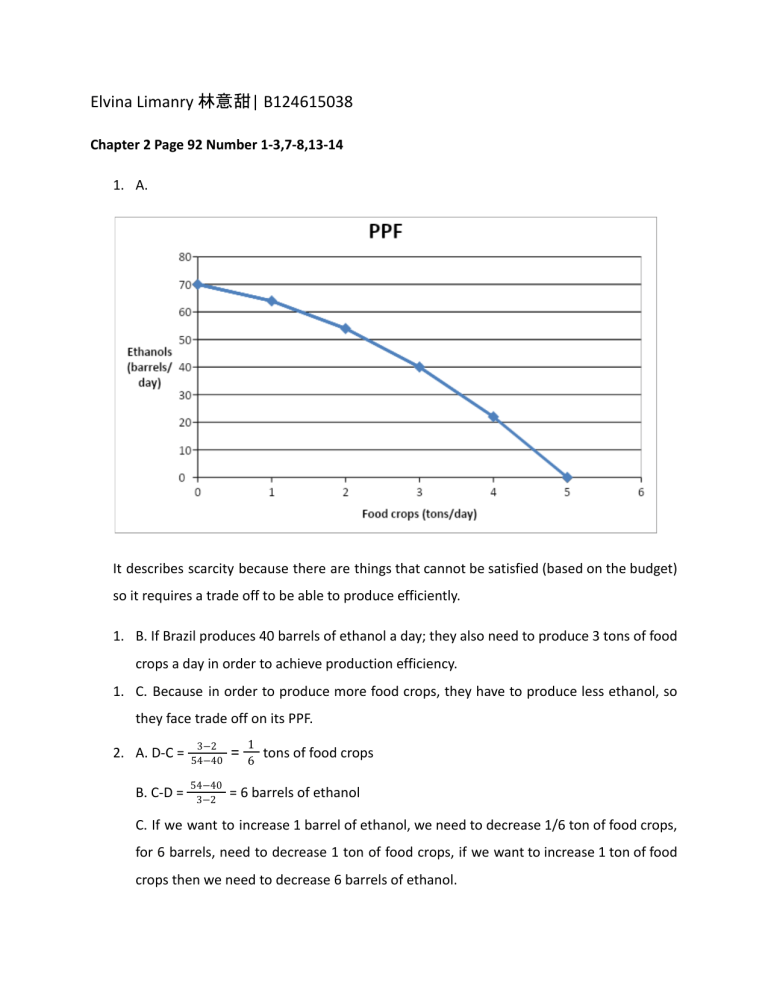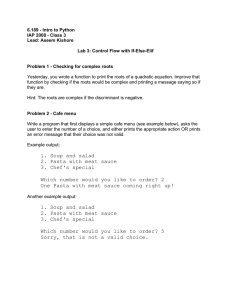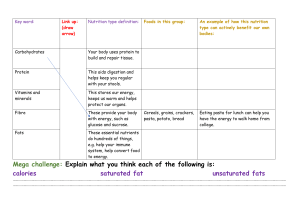
Elvina Limanry 林意甜| B124615038 Chapter 2 Page 92 Number 1-3,7-8,13-14 1. A. It describes scarcity because there are things that cannot be satisfied (based on the budget) so it requires a trade off to be able to produce efficiently. 1. B. If Brazil produces 40 barrels of ethanol a day; they also need to produce 3 tons of food crops a day in order to achieve production efficiency. 1. C. Because in order to produce more food crops, they have to produce less ethanol, so they face trade off on its PPF. 1 6 2. A. D-C = 3−2 54−40 = B. C-D = 54−40 3−2 = 6 barrels of ethanol tons of food crops C. If we want to increase 1 barrel of ethanol, we need to decrease 1/6 ton of food crops, for 6 barrels, need to decrease 1 ton of food crops, if we want to increase 1 ton of food crops then we need to decrease 6 barrels of ethanol. 3. Yes, Brazil faces an increasing opportunity cost of ethanol, by decreasing ethanol in order to create the opportunity of producing tons of food crops. 7. A. Marco Minutes to Produce 1 Item Quantity/Hour Sauce 60 5 = 12 minutes 5 Pasta 60 15 = 4 minutes 15 Giorgia Minutes to Produce 1 Item Quantity/Hour Sauce 60 8 = 7,5 minutes 8 Pasta 60 20 = 3 minutes 20 Marco’s opportunity cost producing pesto sauce 12/4 = 3 pasta B. Giorgia’s opportunity cost producing pesto sauce 7,5/3 = 2,5 pasta C. Giorgia has a comparative advantage because she only needs to cost 2,5 pasta to make pesto sauce while Marco needs 3 pasta in order to make pesto sauce. D. Marco gains from trade and also with Giorgia, Marco gains pesto sauce from Giorgia with the lower cost comparing him making it himself, Giorgia also gains from the trade because she got higher than her produce pesto sauce. 8. A. Giorgia Minutes to Produce 1 Item Quantity / Hour Sauce 7,5 minutes 8 Pasta 60/30 = 2 minutes 30 7,5/2 = 3,75 pasta Now, Giorgia has a comparative advantage in producing pasta because she got lower opportunity cost than Marco Marco 1 pasta = 1/3 = 5/15 Giorgia 1 pasta = 8/30 = 4/15 (smaller) B. Yes, because each of them has different comparative advantage so they can specialize the products C. Marco will not willing to trade because the new cost of the pasta is 0.364 while he can make it for the cost of 0.33 13. 150 foods = 75 gallons of sunscreen, 1 food equals to 75/150 = ½ gallons of sunscreen, linear PPF the marginal cost is constant. 14. A. Marginal Benefit of sunscreen is 1, it is measured from the changes of digit in willingness to pay for the sunscreen. B. To achieve allocative efficiency, Yucatan needs to produce 75 gallons of sunscreen. Chapter 3 Page 124 Number 20-23 20. A. 20. B. There will be a shortage of the price, because the market equilibrium is in between of price 60 to 70, so let’s say that the ME is 65 with the quantity of demand and supply of 145, If the price is 60, then it will be lower than the ME, the adjust of the price will make the quantity of demand 10 higher than the quantity of supplied. 21. A. The demand for chips will change, the graph will be moved to the right because of change in quantity demanded (each of the prices added 30 millions of bags, so each of the quantities will be added 30. 21. B. The equilibrium price changed to 80 with the quantity of the supply and demand of 160 because the demand line moved to the right because of changes in the quantity demanded. 22. The supply graph will move to the left because of changes in quantity, because each price will reduce 40 million of bags. The ME will also change into a price of 85 and the quantity of 125 in supply and demand. 23. If the virus hits after a new dip, the ME will be at price of 100 with the quantity of 140 for the supply and demand. Because right after the changes of demand (higher), suddenly there’s a change of supply (lower) so the ME is getting higher and the quantity changed. Chapter 4 Page 145 Number 6, 7, 9, 12-14 6. $130-> $170 (changes $40) (130+170)/2 = 300/2 = 150 (average) (40/150) x 100% = 26,67% A. 15%/26,67% = 0,56 (inelastic) B. 10%/26,67% = 0,37 (inelastic) 7. A. 22/12 = 1,8 -> Price elasticity of demand for orange juice B. 14/12 = 1.2 -> Cross elasticity of demand for apple juice to the price of orange juice 9. A. 135-125 = 10 (125+135)/2 = 130 (10/130) x 100 = 7,69% 36-28 = 8 (28+36)/2 = 32 (8/32) x 100 = 25% (PRICE) (QUAN) 25/7,69 = 3,25 B. (10/125) x 100 = 8% 25/8 = 3,13 C. The supply of jeans is elastic. 12. A. (i) 400-350 = 50 40-35 = 5 400 x 30 = 12.000 (350+400)/2 = 375 (35+40)/2 = 37,5 (50/375) x 100 = 13,33% (5/37,5) x 100 = 13,33% 350 x 35 = 12.250 (increases) 13,33/13,33 = 1 (elastic) a price cut will increase in total revenue by $250.000 (ii) 350-300 = 50 (300+350)/2 = 325 (50/325) x 100 = 15,38 350 x 35 = 12,250 300 x 40 = 12,000 (decrease) 13,33/15,38 = 0,87 (inelastic) brings a decrease in total revenue by $250.000 B. Total revenue is at a maximum when the price $350 because it has the highest total revenue which is $12,25 million 13. (50/350) x 100 = 14,29% 13,33/14,29 = 0,93 14. (50/250) x 100 = 20 13,33/20 = 0,67 (inelastic), the price drops makes the total revenue to decrease. Chapter 5 Page 167 Number 18 18. A. CS = ½(6-3) x 150 = $225 PS = ½(3-0) x 150 = $225 Total surplus = $225 + $225 = $450 B. Because there’s increase in demand and also supply, it can create a deadweight loss, and made the producer surplus to decrease Chapter 6 Page 190-191 Number 1-2, 9-10 1. A. The equilibrium rent is $450 per month and the equilibrium quantity is 20,000 housing units B. If the rent ceiling is set at $600 per month, it will be ineffective because it’s above from the equilibrium, and the house is remain at 20,000 units, there will be no shortage of housing units because of ineffective 2. 600 = 20,000; 300 = (20,000/2) = 10,000 rented, the shortage is 30,000-10,000 = 20,000 units, the maximum price that someone willing to pay for the 10,000 th unit is $600 9. A. The equilibrium meal price is $6 and the equilibrium quantity of meals is 2,500 B. The students will only pay for $6 because of the price is above from the equilibrium ($7) 10. The quantity that they bought (3,000) will create a shortage of 1,500 (3,000-2,500) and the maximum price someones willing to pay is $8.



